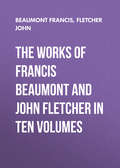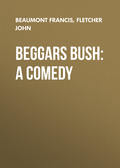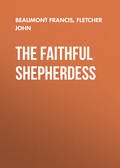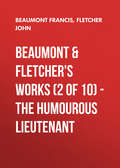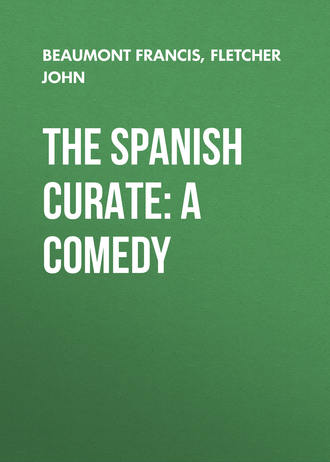
Beaumont Francis
The Spanish Curate: A Comedy
SCENA III
Enter Jamy, Milanes, Arsenio.
Jam.
Angelo, Milanes, did you see this wonder?
Mil.
Yes, yes.
Jam.
And you Arsenio?
Ars.
Yes he's gone, Sir,
Strangely disguis'd, he's set upon his voyage.
Love guide his thoughts: he's a brave honest fellow.
Sit close Don Lawyer, O that arrant knave now,
How he will stink, will smoak again, will burst!
He's the most arrant Beast.
Mil.
He may be more beast.
Jam.
Let him bear six, and six, that all may blaze him,
The villany he has sowed into my Brother,
And from his State, the Revenue he has reach'd at:
Pay him, my good Leandro, take my prayers.
Ars.
And all our wishes plough with his fine white heifer.
Jam.
Mark him (my dear friend) for a famous Cuckold,
Let it out-live his Books, his pains, and hear me,
The more he seeks to smother it with Justice,
Enter a Servant.
Let it blaze out the more: what news Andrea?
Andr.
News I am loth to tell ye: but I am charg'd, sir,
Your Brother layes a strict command upon ye,
No more to know his house, upon your danger,
I am sorry, Sir.
Jam.
Faith never be: I am glad on't,
He keeps the house of pride, and foolery:
I mean to shun it: so return my Answer,
'Twill shortly spew him out; Come, let's be merry,
And lay our heads together, carefully
How we may help our friend; and let's lodge near him,
Be still at hand: I would not for my patrimony,
But he should crown his Lawyer, a learned Monster;
Come, let's away, I am stark mad till I see him.
[Exeunt.
SCENA IV
Enter Bartolus, and Amaranta.
Amar.
Why will ye bring men in, and yet be jealous?
Why will ye lodge a young man, a man able,
And yet repine?
Bar.
He shall not trouble thee, sweet,
A modest poor slight thing, did I not tell thee
He was only given to the Book, and for that
How Royally he paies? finds his own meat too.
Amar.
I will not have him here: I know your courses,
And what fits you will fall into of madness.
Bar.
'Faith, I will not, Wife.
Amar.
I will not try ye.
Bar.
He comes not near thee: shall not dare to tread
Within thy Lodgings: in an old out-Room
Where Logs, and Coles were laid.
Amar.
Now ye lay fire; fire to consume your quiet.
Bar.
Didst thou know him,
Thou wouldst think as I do: he disquiet thee?
Thou mayst wear him next thy heart, and yet not warm him.
His mind (poor man) 's o'th' Law, how to live after,
And not on lewdness: on my Conscience
He knows not how to look upon a Woman
More than by reading what Sex she is.
Amar.
I do not like it, Sir.
Bar.
Do'st thou not see (Fool)
What presents he sends hourly in his gratefulness?
What delicate meats?
Amar.
You had best trust him at your Table,
Do, and repent it, do.
Bar.
If thou be'st willing,
By my troth, I think he might come, he's so modest,
He never speaks: there's part of that he gave me,
He'll eat but half a dozen bits, and rise immediately,
Even as he eats, he studies: he'll not disquiet thee,
Do as thou pleasest, Wife.
Amar.
What means this Wood-cock?
[Knock within.
Bar.
Retire, Sweet, there's one knocks: come in, your business.
Enter Servant.
Ser.
My Lord, Don Henrique, would entreat ye, Sir,
To come immediately, and speak with him,
He has business of some moment.
Bar.
I'le attend him,
I must be gone: I pre'thee think the best, Wife,
At my return, I'le tell thee more, good morrow;
Sir, keep ye close, and study hard: an hour hence
I'le read a new Case to ye.—
[Exit.
[Leandro within.]
Lean.
I'le be ready.
Amar.
So many hundred Duckets, to ly scurvily?
And learn the pelting Law? this sounds but slenderly,
But very poorly: I would see this fellow,
Very fain see him, how he looks: I will find
To what end, and what study: there's the place:
I'le go o'th' other side, and take my Fortune.
I think there is a window.
[Exit.
Enter Leandro.
Lean.
He's gone out
Now, if I could but see her: she is not this way:
How nastily he keeps his house! my Chamber,
If I continue long, will choak me up,
It is so damp: I shall be mortified
For any woma[n], if I stay a month here:
I'le in, and strike my Lute, that sound may call her.
[Exit.
Lute and Song.
1.
Dearest do not you delay me,
Since thou knowest I must be gone;
Wind and Tide 'tis thought doth stay me,
But 'tis wind that must be blown
From that breath, whose native smell
Indian Odours far excel.
2.
Oh then speak thou fairest fair,
Kill not him that vows to serve thee,
But perfume this neighbouring Air;
Else dull silence sure will starve me:
'Tis a word that's quickly spoken,
Which being restrained a heart is broken.
Enter Amaranta.
Amar.
He keeps very close: Lord, how I long to see him!
A Lute strook handsomely, a voice too; I'le hear that:
These Verses are no Law, they sound too sweetly,
Now I am more desirous.
[Leandro peeping.
Lean.
'Tis she certain.
Amar.
What's that that peeps?
Lean.
O admirable face!
Amar.
Sure 'tis the man.
Lean.
I will go out a little.
Amar.
He looks not like a fool, his face is noble:
How still he stands!
Lean.
I am strucken dumb with wonder,
Sure all the Excellence of Earth dwells here.
Amar.
How pale he looks! yet, how his eyes like torches,
Fling their beams round: how manly his face shews!
He comes on: surely he will speak: he is made most handsomly:
This is no Clerk behaviour; now I have seen ye,
I'le take my time: Husband, ye have brought home tinder.
[Exit.
Lean.
Sure she has transform'd me,
I had forgot my tongue clean,
I never saw a face yet, but this rare one,
But I was able boldly to encounter it,
And speak my mind, my lips were lockt up here.
This is divine, and only serv'd with reverence;
O most fair cover of a hand far fairer,
Thou blessed Innocence, that guards that whiteness,
Live next my heart. I am glad I have got a relick,
[A noise within]
A relick when I pray to it, may work wonders.
Hark, there's some noise: I must retire again.
This blessed Apparition makes me happy;
I'le suffer, and I'le sacrifice my substance,
But I'le enjoy: now softly to my Kennel.
[Exit.
Actus Tertius. Scena Prima
Enter Henrique, and Bartolus.
Hen.
You know my cause sufficiently?
Bar.
I do Sir.
Hen.
And though it will impair my honesty,
And strike deep at my Credit, yet, my Bartolus,
There being no other evasion left to free me
From the vexation of my spightful Brother,
That most insultingly raigns over me,
I must and will go forward.
Bar.
Do, my Lord,
And look not after credit, we shall cure that,
Your bended honesty we shall set right, Sir,
We Surgeons of the Law do desperate Cures, Sir,
And you shall see how heartily I'le handle it:
Mark how I'le knock it home: be of good chear, Sir,
You give good Fees, and those beget good Causes,
The Prerogative of your Crowns will carry the matter,
(Carry it sheer) the Assistant sits to morrow,
And he's your friend, your monyed men love naturally,
And as your loves are clear, so are your Causes.
Hen.
He shall not want for that.
Bar.
No, no, he must not,
Line your Cause warmly, Sir, the times are Aguish,
That holds a Plea in heart; hang the penurious,
Their Causes (like their purses) have poor Issues.
Hen.
That way, I was ever bountiful.
Bar.
'Tis true, Sir,
That makes ye fear'd, forces the Snakes to kneel to ye,
Live full of mony, and supply the Lawyer,
And take your choice of what mans lands you please, Sir,
What pleasures, or what profits; what revenges,
They are all your own: I must have witnesses
Enough, and ready.
Hen.
You shall not want, my Bartolus.
Bar.
Substantial fearless souls, that will swear suddenly,
That will swear any thing.
Hen.
They shall swear truth too.
Bar.
That's no great matter: for variety
They may swear truth, else 'tis not much look'd after:
I will serve Process, presently, and strongly,
Upon your Brother, and Octavio,
Jacintha, and the Boy; provide your proofs, Sir,
And set 'em fairly off, be sure of Witnesses,
Though they cost mony, want no store of witnesses,
I have seen a handsome Cause so foully lost, Sir,
So beastly cast away for want of Witnesses.
Hen.
There shall want nothing.
Bar.
Then be gone, be provident,
Send to the Judge a secret way: you have me,
And let him understand the heart.
Hen.
I shall, Sir.
Bar.
And feel the pulses strongly beat, I'le study,
And at my hour, but mark me, go, be happy,
Go and believe i'th' Law.
Hen.
I hope 'twill help me.
[Exeunt.
SCENA II
Enter Lopez, Diego, and four Parishioners and Singers.
Lop.
Ne're talk to me, I will not stay amongst ye,
Debaush'd and ignorant lazie knaves I found ye,
And fools I leave ye. I have taught these twenty years,
Preacht spoon-meat to ye, that a Child might swallow,
Yet ye are Block-heads still: what should I say to ye?
Ye have neither faith, nor mony left to save ye,
Am I a fit companion for such Beggers?
1..
If the Shepheard will suffer the sheep to be scab'd, Sir—
Lop.
No, no ye are rotten.
Die.
Would they were, for my sake.
Lap.
I have Nointed ye, and Tarr'd ye with my Doctrine,
And yet the Murren sticks to ye, yet ye are Mangy,
I will avoid ye.
2..
Pray ye, Sir, be not angry,
In the pride of your new Cassock, do not part with us,
We do acknowledge ye are a careful Curate,
And one that seldom troubles us with Sermons,
A short slice of a Reading serves us, Sir,
We do acknowledge ye a quiet Teacher,
Before you'll vex your Audience, you'll sleep with 'em,
And that's a loving thing.
3..
We grant ye, Sir,
The only benefactor to our Bowling,
To all our merry Sports the first provoker,
And at our Feasts, we know there is no reason,
But you that edifie us most, should eat most.
Lop.
I will not stay for all this, ye shall know me
A man born to a more beseeming fortune
Than ringing all-in, to a rout of Dunces.
4..
We will increase your Tithes, you shall have Eggs too,
Though they may prove most dangerous to our Issues.
1..
I am a Smith; yet thus far out of my love,
You shall have the tenth Horse I prick, to pray for,
I am sure I prick five hundred in a year, Sir.
2..
I am a Cook, a man of a dri'd Conscience,
Yet thus far I relent: you shall have tith Pottage.
3.
Your stipend shall be rais'd too, good Neighbour Diego.
Die.
Would ye have me speak for ye? I am more angry,
Ten times more vex'd, not to be pacified:
No, there be other places for poor Sextons,
Places of profit, Friends, fine stirring places,
And people that know how to use our Offices,
Know what they were made for: I speak for such Capons?
Ye shall find the Key o'th' Church
Under the door, Neighbours,
You may go in, and drive away the Dawes.
Lop.
My Surpless, with one sleeve, you shall find there,
For to that dearth of Linnen you have driven me;
And the old Cutwork Cope, that hangs by Geometry:
'Pray ye turn 'em carefully, they are very tender;
The remnant of the Books, lie where they did, Neighbours,
Half puft away with the Church-wardens pipings,
Such smoaky zeals they have against hard places.
The Poor-mans Box is there too: if ye find any thing
Beside the Posie, and that half rub'd out too,
For fear it should awake too much charity,
Give it to pious uses, that is, spend it.
Die.
The Bell-ropes, they are strong enough to hang ye,
So we bequeath ye to your destiny.
1.
'Pray ye be not so hasty.
Die.
I'le speak a proud word to ye,
Would ye have us stay?
2.
We do most heartily pray ye.
3.
I'le draw as mighty drink, Sir.
Lop.
A strong motive,
The stronger still, the more ye come unto me.
3. And I'le send for my Daughter.
Lop.
This may stir too:
The Maiden is of age, and must be edified.
4.
You shall have any thing: lose our learned Vicar?
And our most constant friend; honest dear Diego?
Die.
Yet all this will not do: I'le tell ye, Neighbours,
And tell ye true, if ye will have us stay,
If you will have the comforts of our companies,
You shall be bound to do us right in these points,
You shall be bound, and this the obligation,
Dye when 'tis fit, that we may have fit duties,
And do not seek to draw out our undoings,
Marry try'd Women, that are free, and fruitful,
Get Children in abundance, for your Christnings,
Or suffer to be got, 'tis equal justice.
Lop.
Let Weddings, Christnings, Churchings, Funerals,
And merry Gossippings go round, go round still,
Round as a Pig, that we may find the profit.
Die.
And let your old men fall sick handsomely,
And dye immediately, their Sons may shoot up:
Let Women dye o'th' Sullens too, 'tis natural,
But be sure their Daughters be of age first,
That they may stock us still: your queazie young Wives
That perish undeliver'd, I am vext with,
And vext abundantly, it much concerns me,
There's a Child's Burial lost, look that be mended.
Lop.
Let 'em be brought to Bed, then dye when they please.
These things considered, Country-men, and sworn to.
2.
All these, and all our Sports again, and Gambols.
3.
We must dye, and we must live, and we'll be merry,
Every man shall be rich by one another.
2.
We are here to morrow and gone to day, for my part
If getting Children can befriend my Neighbours,
I'le labour hard but I'le fill your Font, Sir.
1.
I have a Mother now, and an old Father,
They are as sure your own, within these two months—
4.
My Sister must be pray'd for too, she is desperate,
Desperate in love.
Die.
Keep desperate men far from her,
Then 'twill go hard: do you see how melancholy?
Do you mark the man? do you profess ye love him?
And would do any thing to stay his fury?
And are ye unprovided to refresh him,
To make him know your loves? fie Neighbours.
2.
We'll do any thing.
We have brought Musick to appease his spirit,
And the best Song we'll give him.
Die.
'Pray ye sit down, Sir,
They know their duties now, and they stand ready
To tender their best mirth.
Lop.
'Tis well, proceed Neighbours,
I am glad I have brought ye to understand good manners,
Ye had Puritan hearts a-while, spurn'd at all pastimes,
But I see some hope now.
Die.
We are set, proceed Neighbours.
SONG.
1
Let the Bells ring, and let the Boys sing,
The young Lasses skip and play,
Let the Cups go round, till round goes the ground,
Our Learned old Vicar will stay.
2
Let the Pig turn merrily, merrily ah,
And let the fat Goose swim,
For verily, verily, verily ah,
Our Vicar this day shall be trim.
3
The stewed Cock shall Crow, Cock-a-loodle-loo,
A loud Cock-a-loodle shall he Crow;
The Duck and the Drake, shall swim in a lake
Of Onions and Claret below.
4
Our Wives shall be neat, to bring in our meat;
To thee our most noble adviser,
Our pains shall be great, and Bottles shall sweat,
And we our selves will be wiser.
5
We'll labour and swinck, we'll kiss and we'll drink,
And Tithes shall come thicker and thicker;
We'll fall to our Plow, and get Children enough,
And thou shalt be learned old Vicar.
Enter Arsenio and Milanes.
Ars.
What ails this Priest? how highly the thing takes it!
Mil.
Lord how it looks! has he not bought some Prebend?
Leandro's mony makes the Rascal merry,
Merry at heart; he spies us.
Lop.
Be gone Neighbours,
Here are some Gentlemen: be gone good Neighbours,
Be gone, and labour to redeem my favour,
No more words, but be gone: these two are Gentlemen,
No company for crusty-handed fellows.
Die.
We will stay for a year or two, and try ye.
Lop.
Fill all your hearts with joy, we will stay with ye,
Be gone, no more; I take your pastimes graciously.
[Exeunt Parishioners.
Would ye with me, my friends?
Ars.
We would look upon ye,
For me thinks ye look lovely.
Lop.
Ye have no Letters?
Nor any kind Remembrances?
Mil.
Remembrances?
Lop.
From Nova Hispania, or some part remote, Sir,
You look like Travel'd men: may be some old friends
That happily I have forgot; some Signiours
In China or Cataya; some Companions—
Die.
In the Moguls Court, or else-where.
Ars.
They are mad sure.
Lop.
Ye came not from Peru? do they look, Diego,
As if they had some mystery about 'em?
Another Don Alonzo now?
Die.
I marry,
And so much mony, Sir, from one you know not,
Let it be who it will.
Lop.
They have gracious favours.
Would ye be private?
Mil. There's no need on't, Sir,
We come to bring ye a Remembrance from a Merchant.
Lop.
'Tis very well, 'tis like I know him.
Ars.
No, Sir,
I do not think ye do.
Lop.
A new mistake, Diego,
Let's carry it decently.
Ars.
We come to tell ye,
You have received great sums from a young Factor
They call Leandro, that has rob'd his Master,
Rob'd him, and run away.
Die.
Let's keep close, Master;
This news comes from a cold Country.
Lop.
By my faith it freezes.
Mil.
Is not this true? do you shrink now good-man Curat?
Do I not touch ye?
Lop.
We have a hundred Duckets
Yet left, we do beseech ye, Sir—
Mil.
You'll hang both.
Lop.
One may suffice.
Die.
I will not hang alone, Master,
I had the least part, you shall hang the highest.
Plague o' this Tiveria, and the Letter,
The Devil sent it post, to pepper us,
From Nova Hispania, we shall hang at home now.
Ars.
I see ye are penitent, and I have compassion:
Ye are secure both; do but what we charge ye,
Ye shall have more gold too, and he shall give it,
Yet ne're indanger ye.
Lop.
Command us, Master,
Command us presently, and see how nimbly—
Die.
And if we do not handsomely endeavour—
Ars.
Go home, and till ye hear more, keep private,
Till we appear again, no words, Vicar,
There's something added.
Mil.
For you too.
Lop.
We are ready.
Mil.
Go and expect us hourly, if ye falter,
Though ye had twenty lives—
Die.
We are fit to lose 'em.
Lop.
'Tis most expedient that we should hang both.
Die.
If we be hang'd, we cannot blame our fortune.
Mil.
Farewel, and be your own friends.
Lop.
We expect ye.—
[Exeunt.
SCENA III
Enter Octavio, Jacintha, and Ascanio.
Octa.
We cited to the Court!
{A Bar, Table-book, 2 Chairs, and Paper, standish set out.
Jac.
It is my wonder.
Octa.
But not our fear, Jacintha; wealthy men,
That have Estates to lose; whose conscious thoughts
Are full of inward guilt, may shake with horrour
To have their Actions sifted, or appear
Before the Judge. But we that know our selves
As innocent, as poor, that have no Fleece
On which the Talons of the griping Law
Can take sure hold, may smile with scorn on all
That can be urg'd against us.
Jac.
I am confident
There is no man so covetous, that desires
To ravish our wants from us, and less hope
There can be so much Justice left on earth,
(T[h]ough sued, and call'd upon) to ease us of
The burthen of our wrongs.
Octa.
What thinks Ascanio?
Should we be call'd in question, or accus'd
Unjustly, what would you do to redeem us
From tyrannous oppression?
Asc.
I could pray
To him that ever has an open ear,
To hear the innocent, and right their wrongs;
Nay, by my troth, I think I could out-plead
An Advocate, and sweat as much as he
Do's for a double Fee, ere you should suffer
In an honest cause.
Enter Jamie and Bartolus.
Octa.
Happy simplicitie!
Jac.
My dearest and my best one, Don Jamie.
Octa.
And the Advocate, that caus'd us to be summon'd.
Asc.
My Lord is mov'd, I see it in his looks,
And that man, in the Gown, in my opinion
Looks like a proguing Knave.
Jac.
Peace, give them leave.
Jam.
Serve me with Process?
Bar.
My Lord, you are not lawless.
Jam.
Nor thou honest;
One, that not long since was the buckram Scribe,
That would run on mens errands for an Asper,
And from such baseness, having rais'd a Stock
To bribe the covetous Judge, call'd to the Bar.
So poor in practice too, that you would plead
A needy Clyents Cause, for a starv'd Hen,
Or half a little Loin of Veal, though fly-blown,
And these, the greatest Fees you could arrive at
For just proceedings; but since you turn'd Rascal—
Bar.
Good words, my Lord.
Jam.
And grew my Brothers Bawd,
In all his vitious courses, soothing him
In his dishonest practises, you are grown
The rich, and eminent Knave, in the Devils name,
What am I cited for?
Bar.
You shall know anon,
And then too late repent this bitter language,
Or I'll miss of my ends.
Jam.
Were't not in Court,
I would beat that fat of thine, rais'd by the food
Snatch'd from poor Clyents mouths, into a jelly:
I would (my man of Law) but I am patient,
And would obey the Judge.
Bar.
'Tis your best course:
Would every enemy I have would beat me,
I would wish no better Action.
Octa.
'Save your Lordship.
Asc.
My humble service.
Jam.
My good Boy, how dost thou?
Why art thou call'd into the Court?
Enter Assistant, Henrique, Officer, and Witnesses.
Asc.
I know not,
But 'tis my Lord the Assistants pleasure
I should attend here.
Jam.
He will soon resolve us.
Offi.
Make way there for the Judge.
Jam.
How? my kind Brother?
Nay then 'tis rank: there is some villany towards.
Assist.
This Sessions purchas'd at your suit, Don Henrique,
Hath brought us hither, to hear and determine
Of what you can prefer.
Hen.
I do beseech
The honourable Court, I may be heard
In my Advocate.
Assist.
'Tis granted.
Bar.
Humh, humh.
Jam.
That Preface,
If left out in a Lawyer, spoils the Cause,
Though ne're so good, and honest.
Bar.
If I stood here,
To plead in the defence of an ill man,
(Most equal Judge) or to accuse the innocent
(To both which, I profess my self a stranger)
It would be requisite I should deck my Language
With Tropes and Figures, and all flourishes
That grace a Rhetorician, 'tis confess'd
Adulterate Metals need the Gold-smiths Art,
To set 'em off; what in it self is perfect
Contemns a borrowed gloss: this Lord (my Client)
Whose honest cause, when 'tis related truly,
Will challenge justice, finding in his Conscience
A tender scruple of a fault long since
By him committed, thinks it not sufficient
To be absolv'd of't by his Confessor,
If that in open Court he publish not
What was so long conceal'd.
Jam.
To what tends this?
Bar.
In his young years (it is no miracle
That youth, and heat of blood, should mix together)
He look'd upon this woman, on whose face
The ruines yet remain, of excellent form,
He look'd on her, and lov'd her.
Jac.
You good Angels,
What an impudence is this?
Bar.
And us'd all means
Of Service, Courtship, Presents, that might win her
To be at his devotion: but in vain;
Her Maiden Fort, impregnable held out,
Until he promis'd Marriage; and before
These Witnesses a solemn Contract pass'd
To take her as his Wife.
Assist.
Give them their Oath.
Jam.
They are incompetent Witnesses, his own Creatures,
And will swear any thing for half a Royal.
Offi.
Silence.
Assist.
Proceed.
Bar.
Upon this strong assurance
He did enjoy his wishes to the full,
Which satisfied, and then with eyes of Judgement
(Hood-wink'd with Lust before) considering duly
The inequality of the Match, he being
Nobly descended, and allyed, but she
Without a name, or Family, secretly
He purchas'd a Divorce, to disanul
His former Contract, Marrying openly
The Lady Violante.
Jac.
As you sit here
The Deputy of the great King, who is
The Substitute of that impartial Judge,
With whom, or wealth, or titles prevail nothing,
Grant to a much wrong'd Widow, or a Wife
Your patience, with liberty to speak
In her own Cause, and let me face to face
To this bad man, deliver what he is:
And if my wrongs, with his ingratitude ballanc'd,
Move not compassion, let me die unpitied;
His Tears, his Oaths, his Perjuries, I pass o're;
To think of them is a disease; but death
Should I repeat them. I dare not deny,
(For Innocence cannot justifie what's false)
But all the Advocate hath alledged concerning
His falshood, and my shame, in my consent,
To be most true: But now I turn to thee,
To thee Don Henrique, and if impious Acts
Have left thee blood enough to make a blush,
I'le paint it on thy cheeks. Was not the wrong
Sufficient to defeat me of mine honour,
To leave me full of sorrow, as of want,
The witness of thy lust left in my womb,
To testifie thy falshood, and my shame?
But now so many years I had conceal'd
Thy most inhumane wickedness, and won
This Gentleman, to hide it from the world,
To Father what was thine (for yet by Heaven,
Though in the City he pass'd for my husband,
He never knew me as his wife.)
Assist.
'Tis strange:
Give him an Oath.
Oct.
I gladly swear, and truly.
Jac.
After all this (I say) when I had born
These wrongs, with Saint-like patience, saw another
Freely enjoy, what was (in Justice) mine,
Yet still so tender of thy rest and quiet,
I never would divulge it, to disturb
Thy peace at home; yet thou most barbarous,
To be so careless of me, and my fame,
(For all respect of thine in the first step
To thy base lust, was lost) in open Court
To publish my disgrace? and on record,
To write me up an easie-yielding wanton?
I think can find no precedent: In my extreams,
One comfort yet is left, that though the Law
Divorce me from thy bed, and made free way
To the unjust embraces of another,
It cannot yet deny that this thy Son
(Look up Ascanio since it is come out)
Is thy legitimate heir.
Jam.
Confederacie!
A trick (my Lord) to cheat me; e're you give
Your Sentence, grant me hearing.
Assist.
New Chimera's?
Jam.
I am (my Lord) since he is without Issue,
Or hope of any, his undoubted heir,
And this forg'd by the Advocate, to defeat me
Of what the laws of Spain confer upon me,
A meer Imposture, and conspiracie
Against my future fortunes.
Assist.
You are too bold.
Speak to the cause Don Henrique.
Hen.
I confess,
(Though the acknowledgment must wound mine honour,)
That all the Court hath heard touching this Cause,
(Or with me, or against me) is most true:
The later part my Brother urg'd, excepted:
For what I now doe, is not out of Spleen
(As he pretends) but from remorse of conscience
And to repair the wrong that I have done
To this poor woman: And I beseech your Lordship
To think I have not so far lost my reason,
To bring into my familie, to succeed me,
The stranger—Issue of anothers Bed,
By proof, this is my Son, I challenge him,
Accept him, and acknowledge him, and desire
By a definitive Sentence of the Court,
He may be so recorded, and full power
To me, to take him home.
Jac.
A second rape
To the poor remnant of content that's left me,
If this be granted: and all my former wrongs
Were but beginnings to my miseries,
But this the height of all: rather than part
With my Ascanio, I'le deny my oath,
Profess my self a Strumpet, and endure
What punishment soe're the Court decrees
Against a wretch that hath forsworn her self,
Or plai'd the impudent whore.
Assist.
This tastes of passion,
And that must not divert the course of Justice;
Don Henrique, take your Son, with this condition
You give him maintenance, as becomes his birth,
And 'twill stand with your honour to doe something
For this wronged woman: I will compel nothing,
But leave it to your will. Break up the Court:
It is in vain to move me; my doom's pass'd,
And cannot be revok'd.—
[Exit.
Hen.
There's your reward.
Bar.
More causes, and such Fees. Now to my Wife,
I have too long been absent: Health to your Lordship.
[Exit.
Asc.
You all look strangely, and I fear believe
This unexpected fortune makes me proud,
Indeed it do's not: I shall ever pay you
The duty of a son, and honour you
Next to my Father: good my Lord, for yet
I dare not call you, uncle, be not sad,
I never shall forget those noble favours
You did me being a stranger, and if ever
I live to be the master of a fortune,
You shall command it.
Jam.
Since it was determin'd
I should be cozen'd, I am glad the profit
Shall fall on thee, I am too tough to melt,
But something I will do.
Hen.
'Pray you take leave
Of your steward (gentle Brother) the good husband
That takes up all for you.
Jam.
Very well, mock on,
It is your turn: I may have mine—
[Exit.



